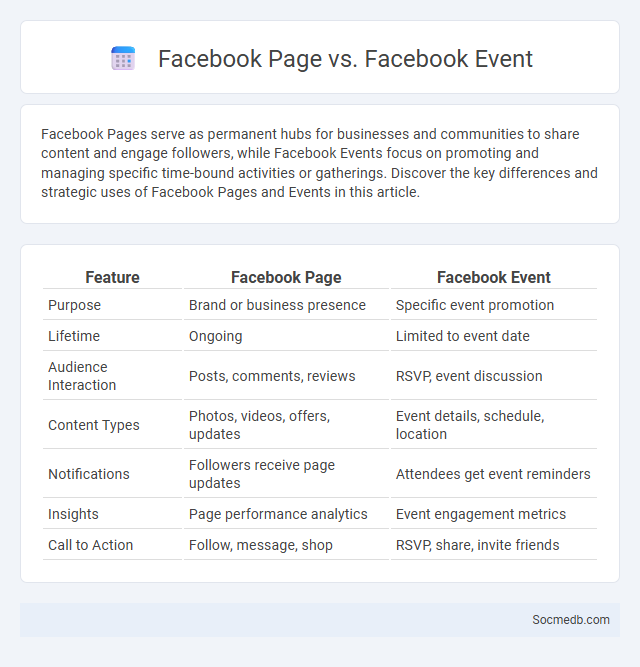
Photo illustration: Facebook Page vs Facebook Event
Facebook Pages serve as permanent hubs for businesses and communities to share content and engage followers, while Facebook Events focus on promoting and managing specific time-bound activities or gatherings. Discover the key differences and strategic uses of Facebook Pages and Events in this article.
Table of Comparison
| Feature | Facebook Page | Facebook Event |
|---|---|---|
| Purpose | Brand or business presence | Specific event promotion |
| Lifetime | Ongoing | Limited to event date |
| Audience Interaction | Posts, comments, reviews | RSVP, event discussion |
| Content Types | Photos, videos, offers, updates | Event details, schedule, location |
| Notifications | Followers receive page updates | Attendees get event reminders |
| Insights | Page performance analytics | Event engagement metrics |
| Call to Action | Follow, message, shop | RSVP, share, invite friends |
Introduction to Facebook Platforms
Facebook Platforms offer a comprehensive suite of tools designed to help businesses and developers create engaging social media experiences. These platforms include the Facebook app, Messenger, Instagram, and WhatsApp, enabling seamless integration and cross-platform communication. Leveraging APIs, SDKs, and analytics, users can build custom applications, run targeted advertising campaigns, and access valuable user insights.
What Is a Facebook Page?
A Facebook page is a public profile specifically created for businesses, brands, celebrities, or organizations to connect with their audience on Facebook. It allows admins to publish posts, share updates, promote events, and engage with followers through comments and messages. With features like analytics and advertising tools, a Facebook page helps enhance online presence and reach targeted demographics effectively.
Understanding Facebook Events
Facebook Events enable users to create, manage, and promote gatherings with detailed information such as date, location, and description. This feature enhances community engagement by allowing invitations, RSVP tracking, and direct communication with attendees. Optimizing event visibility through targeted sharing and audience interaction increases participation and boosts event success.
Facebook Group: An Overview
Facebook Groups serve as dynamic online communities tailored to specific interests, enabling users to share content, engage in discussions, and collaborate effectively. These groups offer customizable privacy settings--public, closed, or secret--providing control over membership and content visibility. With features like polls, events, and file sharing, Facebook Groups enhance user interaction and foster niche community growth.
Key Differences Between Page, Event, and Group
Social media platforms differentiate between Pages, Events, and Groups by their core functions and target interactions; Pages serve as official profiles for businesses, brands, or public figures to broadcast content and engage fans, Events enable users to organize and promote specific occasions with RSVPs and reminders, while Groups facilitate community building by allowing members to share content and converse around common interests. Pages typically offer analytics and advertising tools aimed at audience growth, Events provide scheduling features and attendee management, and Groups emphasize discussions, member posts, and privacy controls ranging from public to secret access. Understanding these distinctions helps optimize social media strategies by choosing the right feature for brand promotion, event management, or community engagement.
Use Cases for Facebook Pages
Facebook Pages enable businesses and creators to connect with their audience through targeted marketing campaigns, event promotions, and community engagement. Your brand can leverage features like post scheduling, customer reviews, and analytics to optimize reach and improve interaction. Using Facebook Pages effectively boosts visibility, drives website traffic, and fosters customer loyalty.
Advantages of Using Facebook Events
Facebook Events offers a powerful tool for organizing and promoting gatherings, enabling you to easily reach a broad audience through targeted invitations and reminders. The platform's integration with your social network enhances engagement by allowing attendees to interact, share updates, and RSVP in real-time. Utilizing Facebook Events helps increase visibility and attendance, improving the overall success of your social or professional occasions.
When to Choose a Facebook Group
Choosing a Facebook Group is ideal when you want to build a focused community around shared interests, foster direct engagement, and facilitate meaningful conversations. Your group can provide a private space for members to share insights, support each other, and access exclusive content. This approach is perfect for brands, organizations, or individuals aiming to create loyal, interactive audiences beyond typical social media reach.
Engagement Strategies for Each Platform
Effective engagement strategies vary across social media platforms to maximize audience interaction. On Instagram, leveraging visually appealing stories, reels, and interactive polls encourages user participation, while on Twitter, timely replies and trending hashtag usage boost visibility and conversation. Tailoring your content approach on LinkedIn by sharing industry insights and asking thoughtful questions fosters professional networking and meaningful engagement.
Which Facebook Platform Is Best for Your Needs?
Choosing the best Facebook platform depends on your goals: Facebook Pages are ideal for businesses seeking brand awareness and customer engagement, offering tools for marketing and analytics. Facebook Groups foster community building and direct interaction, perfect for niche audiences and loyal customer bases. Facebook Marketplace suits those focused on buying and selling products locally, providing a convenient platform for peer-to-peer transactions.
 socmedb.com
socmedb.com